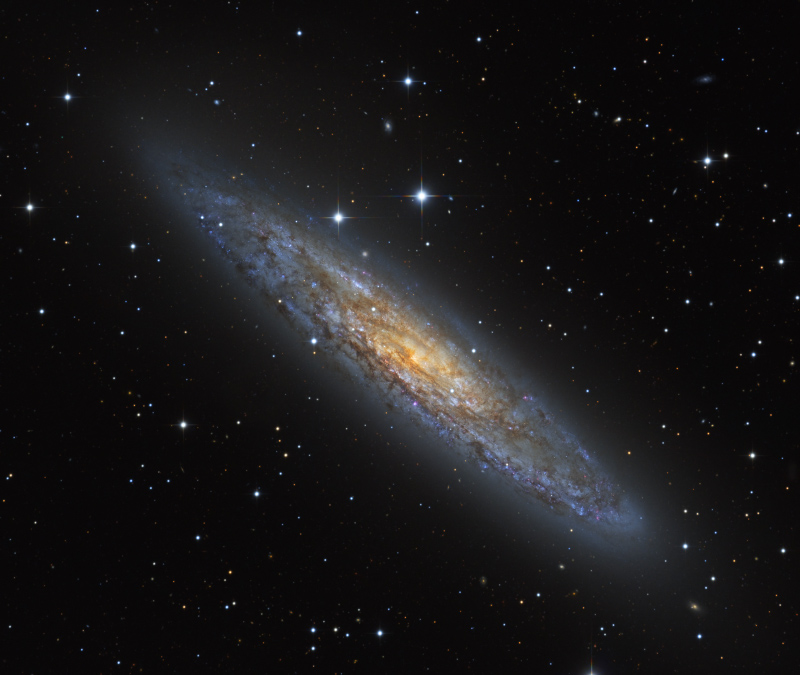Submissions: 2021 October
-
vanamonde81
- Science Officer
- Posts: 143
- Joined: Fri Apr 12, 2013 7:46 am
Re: Submissions: 2021 October
☾☾☾ @HHH
Copyright: György Soponyai
On Monday early dawn I observed and captured the rising crescent Moon from Guckler lookout tower at Hármashatár-hegy (HHH). Look at the dance of the moonshine during the 12-minute-long exposure caused by the turbulent air.
2021.10.04. Budapest, Hungary
Canon EOS 5D Mark II + Canon EF 200/2.8L + Optolong Clear Sky filter
13 x 55sec, f/7.1, ISO 100
Copyright: György Soponyai
On Monday early dawn I observed and captured the rising crescent Moon from Guckler lookout tower at Hármashatár-hegy (HHH). Look at the dance of the moonshine during the 12-minute-long exposure caused by the turbulent air.
2021.10.04. Budapest, Hungary
Canon EOS 5D Mark II + Canon EF 200/2.8L + Optolong Clear Sky filter
13 x 55sec, f/7.1, ISO 100
- the_astronomy_enthusiast
- Ensign
- Posts: 98
- Joined: Fri Apr 16, 2021 10:16 pm
- Contact:
Re: Submissions: 2021 October
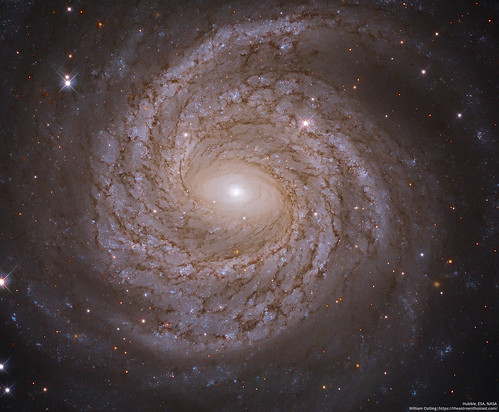
NGC 6814 by William Ostling, on Flickr
A full write up is available to view here: https://theastroenthusiast.com/ngc-6814-from-hubble/
Together with irregular galaxies, spiral galaxies make up approximately 60 percent of the galaxies in the local universe. However, despite their prevalence, each spiral galaxy is unique — like snowflakes, no two are alike. This is demonstrated by the striking face-on spiral galaxy NGC 6814, whose luminous nucleus and spectacular sweeping arms, rippled with an intricate pattern of dark dust, are captured in this NASA/ESA Hubble Space Telescope image.
NGC 6814 has an extremely bright nucleus, a telltale sign that the galaxy is a Seyfert galaxy. These galaxies have very active centers that can emit strong bursts of radiation. The luminous heart of NGC 6814 is a highly variable source of X-ray radiation, causing scientists to suspect that it hosts a supermassive black hole with a mass about 18 million times that of the sun.
Website: https://theastroenthusiast.com/>
Instagram: https://www.instagram.com/the_astronomy_enthusiast/
Re: Submissions: 2021 October
M63 in H-alpha and continuum light
M63 is a spiral galaxy in constellation Canes Venatici.
The image is calculated with and without H-alpha information. By toggling between the two variants the correlation between HII gas clouds and bluish regions (containing young stars and probably also OIII gas) can be visualized.
Click on the animation for detailed information and full resolution pictures.
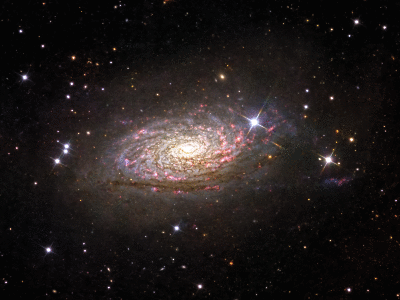
---
My Homepage
RSS news feed
M63 is a spiral galaxy in constellation Canes Venatici.
The image is calculated with and without H-alpha information. By toggling between the two variants the correlation between HII gas clouds and bluish regions (containing young stars and probably also OIII gas) can be visualized.
Click on the animation for detailed information and full resolution pictures.

---
My Homepage
RSS news feed
Re: Submissions: 2021 October
SH2-170
SH2-170 is a faint emission nebula in constellation Cassiopeia.
Click on the images for detailed information and full resolution pictures.
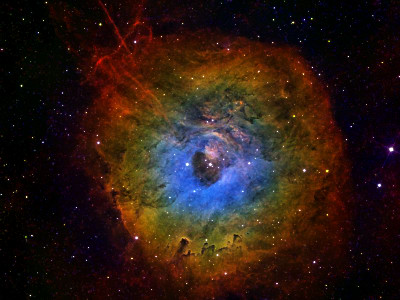
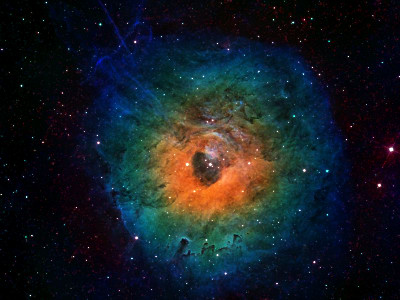
---
My Homepage
RSS news feed
SH2-170 is a faint emission nebula in constellation Cassiopeia.
Click on the images for detailed information and full resolution pictures.


---
My Homepage
RSS news feed
Cygnus Loop
This supernova remnant is what a star hopes for when it wants to die pretty.
Shot on September 26 from my rural backyard in Hartford, Alabama, USA. Taken with the Losmandy GM811G Equatorial Mount, William Optics GT81 Telescope, and a ZWO ASI2600MC Cooled Color Camera.
Shot on September 26 from my rural backyard in Hartford, Alabama, USA. Taken with the Losmandy GM811G Equatorial Mount, William Optics GT81 Telescope, and a ZWO ASI2600MC Cooled Color Camera.
-
Nicolas Adriano
- Ensign
- Posts: 20
- Joined: Wed Oct 07, 2020 5:06 pm
Re: Submissions: 2021 October
Lagoon and Trifid Nebulae - Widefield
Copyright: Nicolas Adriano and Olga W. Ismael
Image URL: https://cdn.astrobin.com/images/67318/2 ... 86332e.png
-Dates: 06, 08, 23 and 24 August 2021| 27 September 2021
-Location: MG, Brazil. Suburban Skies (Bortle 5, calculated SQM ~19.87) / SP, Brazil. Rural Skies ( Bortle 3, calculated SQM ~21.58 )
-Camera: Nikon D5300 (Full Spectrum Modified) @ ISO400 / Canon T6 (Stock) @ ISO1600
-Optics: Rokinon 135mm F/2.0 ED UMC / Canon EF 200 f/2.8 L USM II
-Mount: Sky-Watcher Star Adventurer / Sky-Watcher EQ3-2
-Exposure Detail: 50x300s for Ha / 90x120s for RGB | Total Integration Time = 430' or 7hrs10min.
EmaiL: nicolasadrianofariasanches@outlook.com
Copyright: Nicolas Adriano and Olga W. Ismael
Image URL: https://cdn.astrobin.com/images/67318/2 ... 86332e.png
-Dates: 06, 08, 23 and 24 August 2021| 27 September 2021
-Location: MG, Brazil. Suburban Skies (Bortle 5, calculated SQM ~19.87) / SP, Brazil. Rural Skies ( Bortle 3, calculated SQM ~21.58 )
-Camera: Nikon D5300 (Full Spectrum Modified) @ ISO400 / Canon T6 (Stock) @ ISO1600
-Optics: Rokinon 135mm F/2.0 ED UMC / Canon EF 200 f/2.8 L USM II
-Mount: Sky-Watcher Star Adventurer / Sky-Watcher EQ3-2
-Exposure Detail: 50x300s for Ha / 90x120s for RGB | Total Integration Time = 430' or 7hrs10min.
EmaiL: nicolasadrianofariasanches@outlook.com
IC 1805
Copyrights: Raul Villaverde, Domingo Pestana & Nicolas Romo
 IC_1805_SHO:HOO:RGB_2021 by Raul Villaverde, en Flickr
IC_1805_SHO:HOO:RGB_2021 by Raul Villaverde, en Flickr
 SHO by Raul Villaverde, en Flickr
SHO by Raul Villaverde, en Flickr
 SHOHOO by Raul Villaverde, en Flickr
SHOHOO by Raul Villaverde, en Flickr
 HOO by Raul Villaverde, en Flickr
HOO by Raul Villaverde, en Flickr
 IC_1805_SHO:HOO:RGB_2021 by Raul Villaverde, en Flickr
IC_1805_SHO:HOO:RGB_2021 by Raul Villaverde, en Flickr SHO by Raul Villaverde, en Flickr
SHO by Raul Villaverde, en Flickr SHOHOO by Raul Villaverde, en Flickr
SHOHOO by Raul Villaverde, en Flickr HOO by Raul Villaverde, en Flickr
HOO by Raul Villaverde, en Flickr-
JWainwright
- Asternaut
- Posts: 1
- Joined: Sun Oct 10, 2021 1:56 am
Re: Submissions: 2021 October
NGC 6888, Crescent Nebula.
Copyrights: James M. Wainwright, Orange County, California.
This image was captured from my backyard in Orange County, CA, in a bortle class 8 sky. I captured a total of 7 hours and 30 minutes of data between July 19 and August 15, 2020, and finished processing the image today (October 9, 2021).
I used a Skywatcher EQ6-R Pro equatorial mount, my Explore Scientific ES80 FCD-100 Triplet Refractor, and my ZWO ASI1600MM Pro CMOS camera with Ha and Oiii filters. I processed the image in PixInsight.
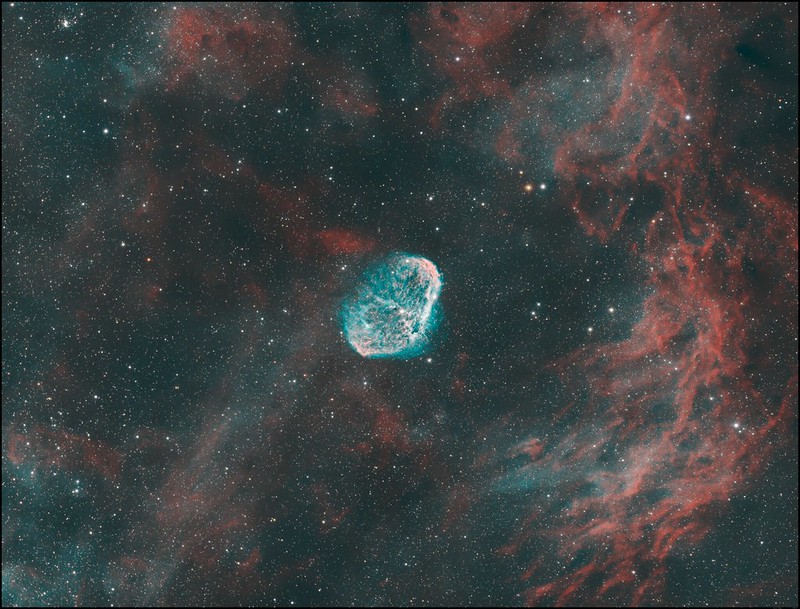 Crescent Nebula by James wainwright, on Flickr
Crescent Nebula by James wainwright, on Flickr
Copyrights: James M. Wainwright, Orange County, California.
This image was captured from my backyard in Orange County, CA, in a bortle class 8 sky. I captured a total of 7 hours and 30 minutes of data between July 19 and August 15, 2020, and finished processing the image today (October 9, 2021).
I used a Skywatcher EQ6-R Pro equatorial mount, my Explore Scientific ES80 FCD-100 Triplet Refractor, and my ZWO ASI1600MM Pro CMOS camera with Ha and Oiii filters. I processed the image in PixInsight.
 Crescent Nebula by James wainwright, on Flickr
Crescent Nebula by James wainwright, on FlickrRe: Submissions: 2021 October
Fornax Dwarf Galaxy with some of the globular clusters that go with it. I wanted to capture something I haven't seen anyone else capture, so this is what I went for since I had plenty of credits to spend on it. Full details including acquisition and processing along with the full size image can be found here on my astrobin 
 Fornax_Dwarf_Galaxy by Scotty Bishop, on Flickr
Fornax_Dwarf_Galaxy by Scotty Bishop, on Flickr

 Fornax_Dwarf_Galaxy by Scotty Bishop, on Flickr
Fornax_Dwarf_Galaxy by Scotty Bishop, on Flickr-
barretosmed
- Science Officer
- Posts: 482
- Joined: Thu Oct 12, 2017 6:04 pm
Re: Submissions: 2021 October
NEBULA IN THE DORADO CONSTELLATION AND IN ITS INTERIOR THE GLOBULAR STAR CLUSTER NGC1761
In this image, a poorly photographed region, we find in the most central region, a little to the left, a lighter region, the bean nebula (NGC 1763), already a little more to the right, another nebula with similar characteristics, but smaller dimensions , the NGC 1769 nebula. Below we have another nebula of importance, the NGC 1773 nebula.
Between the two we have a small globular cluster NGC 1776. Now the big target of the image, the globular cluster NGC 1761, which is the big target in this image.
Best details:
https://www.astrobin.com/full/2304mx/0/
EQUIPMENTS:
ZWO ASI 6200MC PRO COLED
Esprit 150mm
65 x 100sec
Date: 07/31/2021
Location: Jales-SP-Brazil
Copyright: Fernando Oliveira de Menezes
E-mail: Barretosmed@hotmail.com
In this image, a poorly photographed region, we find in the most central region, a little to the left, a lighter region, the bean nebula (NGC 1763), already a little more to the right, another nebula with similar characteristics, but smaller dimensions , the NGC 1769 nebula. Below we have another nebula of importance, the NGC 1773 nebula.
Between the two we have a small globular cluster NGC 1776. Now the big target of the image, the globular cluster NGC 1761, which is the big target in this image.
Best details:
https://www.astrobin.com/full/2304mx/0/
EQUIPMENTS:
ZWO ASI 6200MC PRO COLED
Esprit 150mm
65 x 100sec
Date: 07/31/2021
Location: Jales-SP-Brazil
Copyright: Fernando Oliveira de Menezes
E-mail: Barretosmed@hotmail.com
- Sergio
- Friendly Neighborhood Astrophotographer
- Posts: 100
- Joined: Mon Aug 29, 2011 5:26 pm
- Location: Buenos Aires, Argentina
- Contact:
Re: Submissions: 2021 October
Messier 62 in Ophihuchus
M62 is known for being one of the most irregularly shaped globular clusters in our galaxy. This might be because it is one of the closest globular clusters to the center of our Milky Way suffering from gravitational forces. With a size of 14 arc minutes and a 6.6 visual magnitude this is a very nice visual target for telescopes and a good one for astrophotography even from light polluted locations as my "Bortle 8" home backyard. M62 has an extremely dense core of 150,000 stars that stands out from the crowded star background of Ophiuchus area.
Charles Messier discovered M62 in 1771.
More info at
www.baskies.com.ar
Best Regards
Sergio
M62 is known for being one of the most irregularly shaped globular clusters in our galaxy. This might be because it is one of the closest globular clusters to the center of our Milky Way suffering from gravitational forces. With a size of 14 arc minutes and a 6.6 visual magnitude this is a very nice visual target for telescopes and a good one for astrophotography even from light polluted locations as my "Bortle 8" home backyard. M62 has an extremely dense core of 150,000 stars that stands out from the crowded star background of Ophiuchus area.
Charles Messier discovered M62 in 1771.
More info at
www.baskies.com.ar
Best Regards
Sergio
Re: Submissions: 2021 October
The Ghost of Cassiopeia (Sh2-185) in HSO
Image acquisition & processing by Linda Thomas-Fowler
equipment owned by John Kasianowicz
This is 38 hours of HSO data roughly even split across the filters. I tried to process this thematically to try to make the image make the name. that drove the choice of palette and the ultimate framing and processing decisions. Ultimately it was determined that Navi is an evil star whose sole reason for existing is to put halos and reflections into imagers data.
Full details and full size version available at https://www.astrobin.com/j1vw6c/.

Image acquisition & processing by Linda Thomas-Fowler
equipment owned by John Kasianowicz
This is 38 hours of HSO data roughly even split across the filters. I tried to process this thematically to try to make the image make the name. that drove the choice of palette and the ultimate framing and processing decisions. Ultimately it was determined that Navi is an evil star whose sole reason for existing is to put halos and reflections into imagers data.
Full details and full size version available at https://www.astrobin.com/j1vw6c/.

Re: Submissions: 2021 October
The Pacman Nebula (NGC 281, IC 11, or Sh2-184)
This image was captured through 3nm ultra-narrowband filters and is a composite of ionized Sulphur, Hydrogen, and Oxygen atoms and displayed with a modified SHO "Hubble" Palette. Data was collected over 3 nights from the 27th of September to the 8th of October 2021 from the outskirts of Vancouver, Canada (Botle 6).
High Res: https://astrob.in/lfjyvh/0/
Imaging telescopes or lenses: Planewave CDK 12.5
Mounts: Astro-Physics AP1100 GTO CP4
Dates:Sept. 24, 2021 to Oct. 8, 2021
Chroma 3nm H⍺: 83x300" (6h 55')
Chroma 3nm OIII: 49x300" (4h 5')
Chroma 3nm Sii: 46x300" (3h 50')
Integration: 14h 50'
Pixel scale: 0.710 arcsec/pixel
Rouzbeh Bidshahri
This image was captured through 3nm ultra-narrowband filters and is a composite of ionized Sulphur, Hydrogen, and Oxygen atoms and displayed with a modified SHO "Hubble" Palette. Data was collected over 3 nights from the 27th of September to the 8th of October 2021 from the outskirts of Vancouver, Canada (Botle 6).
High Res: https://astrob.in/lfjyvh/0/
Imaging telescopes or lenses: Planewave CDK 12.5
Mounts: Astro-Physics AP1100 GTO CP4
Dates:Sept. 24, 2021 to Oct. 8, 2021
Chroma 3nm H⍺: 83x300" (6h 55')
Chroma 3nm OIII: 49x300" (4h 5')
Chroma 3nm Sii: 46x300" (3h 50')
Integration: 14h 50'
Pixel scale: 0.710 arcsec/pixel
Rouzbeh Bidshahri
Melote 15
Last night I incorporated a fourth frequency into the image, specifically Hbeta. What I show below is a crop of an image at 380mm and rotated to give the image another focus.
Lumiance is the result of applying maximums to Halfa, Hbeta, OIII and SII and color the sum of SHO and HaOIIIHbeta.
Copyrights: Raul Villaverde, Domingo Pestana,Nicolas Romo.
 melote 15 rotado by Raul Villaverde, en Flickr
melote 15 rotado by Raul Villaverde, en Flickr
Lumiance is the result of applying maximums to Halfa, Hbeta, OIII and SII and color the sum of SHO and HaOIIIHbeta.
Copyrights: Raul Villaverde, Domingo Pestana,Nicolas Romo.
 melote 15 rotado by Raul Villaverde, en Flickr
melote 15 rotado by Raul Villaverde, en Flickr- the_astronomy_enthusiast
- Ensign
- Posts: 98
- Joined: Fri Apr 16, 2021 10:16 pm
- Contact:
Re: Submissions: 2021 October
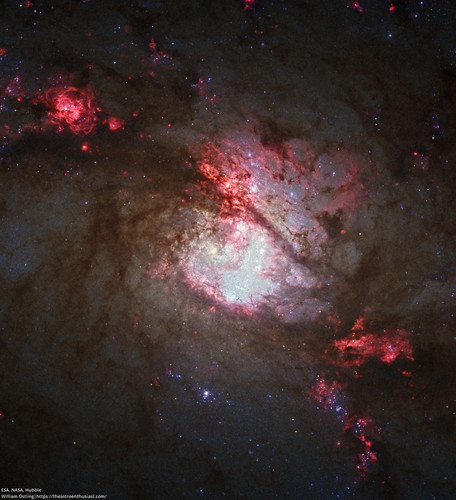
The weird and wonderful core of Messier 83 by William Ostling, on Flickr
You can find a full write-up here: https://theastroenthusiast.com/m83s-core-from-hubble/
The goal of this image is to display the details of the nucleus without blowing any details out too badly. This is hard to do if you show the whole galaxy so I have cropped it to the central area. The very center of the nucleus itself is also dust-obscured and appears as a small, yellowish orb near the center of the image. Using only the visible light you might guess that the nucleus is the larger, U-shaped bright area just south of the nucleus. The dust has a way of confusing things like that. If you look at only the near-IR dataset, all is clear and the nucleus is easily revealed.
The H-alpha (red sections) were added by continuum subtracting from the w814 filter and then re-adding.
Website: https://theastroenthusiast.com/
Instagram: https://www.instagram.com/the_astronomy_enthusiast
Re: Submissions: 2021 October
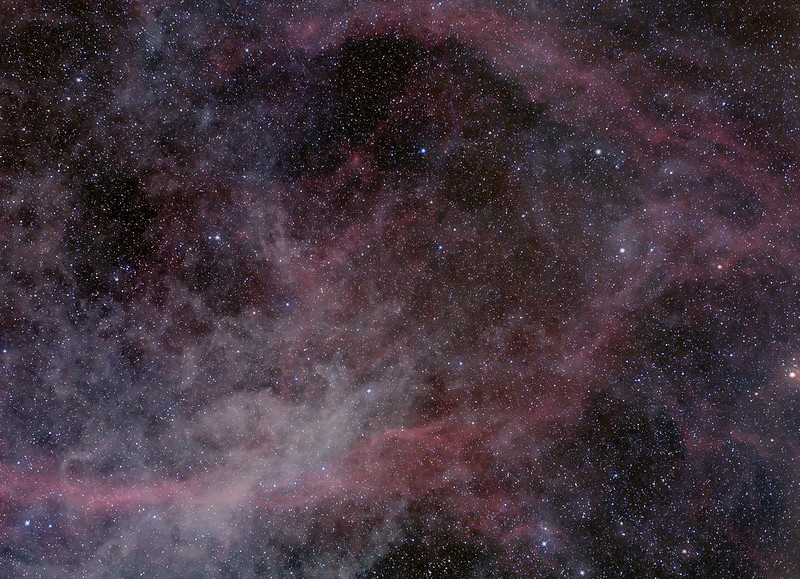
Eridanus Loop - Sh2-245 by Nico Carver (NebulaPhotos.com), on Flickr
The Eridanus Loop is a rarely photographed, very large structure in the night sky. Together with Barnard's Loop, it's part of the Orion-Eridanus Superbubble. I took advantage of some dark skies at the Okie-Tex Star Party to capture it with my Canon Ra, and an 85mm lens. 5 hours integration.
Credit/Copyright: Nico Carver
-
Meiying Lee
- Ensign
- Posts: 66
- Joined: Sun Aug 15, 2021 8:28 am
Re: Submissions: 2021 October
Like Baily's beads
This is the very fine moon I took in the early morning of 20210709. The moon’s age is 28.5 days and the brightness is 1.2%.
I tried to stack 12 extremely thin moon tracks within 55 seconds, and the time interval between each moon was about 5 seconds. The irregular surface of the moon was strengthened, and it seemed as if I saw Baily's beads ! It's just that Baily's beads is in the total solar eclipse, the sun passes through the pothole, so the pothole is bright, but the potholes of this very thin moon are relatively dark!
https://drive.google.com/file/d/1RZ1JvL ... sp=sharing
This is the very fine moon I took in the early morning of 20210709. The moon’s age is 28.5 days and the brightness is 1.2%.
I tried to stack 12 extremely thin moon tracks within 55 seconds, and the time interval between each moon was about 5 seconds. The irregular surface of the moon was strengthened, and it seemed as if I saw Baily's beads ! It's just that Baily's beads is in the total solar eclipse, the sun passes through the pothole, so the pothole is bright, but the potholes of this very thin moon are relatively dark!
https://drive.google.com/file/d/1RZ1JvL ... sp=sharing
Last edited by bystander on Tue Oct 12, 2021 4:00 am, edited 1 time in total.
Reason: All <img> tags require an image url not a page url. Uploaded as an attachment
Reason: All <img> tags require an image url not a page url. Uploaded as an attachment
-
barretosmed
- Science Officer
- Posts: 482
- Joined: Thu Oct 12, 2017 6:04 pm
Re: Submissions: 2021 October
GLOBULAR STAR CLUSTER - MESSIER M28
This cluster is one of the original discoveries of French astronomer Charles Messier, who cataloged it on July 27, 1764.
Located in the constellation Sagittarius, at a distance of approximately 18,000 light years from Earth
Best details:
https://www.astrobin.com/full/lz0eva/0/
EQUIPMENTS:
ZWO ASI 6200MC PRO COLED
Esprit 150mm
63 x 100sec
Date: 08/01/2021
Location: Jales-SP-Brazil
Copyright: Fernando Oliveira de Menezes
E-mail: Barretosmed@hotmail.com
This cluster is one of the original discoveries of French astronomer Charles Messier, who cataloged it on July 27, 1764.
Located in the constellation Sagittarius, at a distance of approximately 18,000 light years from Earth
Best details:
https://www.astrobin.com/full/lz0eva/0/
EQUIPMENTS:
ZWO ASI 6200MC PRO COLED
Esprit 150mm
63 x 100sec
Date: 08/01/2021
Location: Jales-SP-Brazil
Copyright: Fernando Oliveira de Menezes
E-mail: Barretosmed@hotmail.com
Re: Submissions: 2021 October
The Crescent and Soap Bubble with two focal lengths
Another project has ended, this time - the Crescent Nebula with two focal lengths.
This one was a hard, as usually I need only H-Alpha for the larger focal length; For this target I needed both Ha and Oiii for each of the scopes .
Zoom in ! Satisfaction guaranteed !
Imaging telescopes: Askar FRA400 F5.6 · GSO RC8"
Imaging cameras: ZWO ASI294MM Pro · ZWO ASI1600MM Pro
Mounts: iOptron CEM26 · iOptron CEM70
Guiding cameras: ZWO ASI174MM mini · ZWO ASI120MM Mini
Focal reducers: Askar 0.7x Reducer · Astro Physics CCDT67 CCDT67
Software: PHD2 PHD 2 · N.I.N.A. Nighttime Imaging 'N' Astronomy · PixInsight
Filters: Antlia Ha 3nm Pro · Antlia Oiii 3nm Pro · Astrodon Ha 3nm · Astrodon OIII 3nm
Frames:
Antlia Ha 3nm Pro: 60x600" (10h)
Antlia Oiii 3nm Pro: 60x600" (10h)
Astrodon Ha 3nm: 12x1800" (6h)
Astrodon Ha 3nm: 60x600" (10h)
Astrodon OIII 3nm: 32x1800" (16h)
Astrodon OIII 3nm: 60x600" (10h)
Integration: 62h
Another project has ended, this time - the Crescent Nebula with two focal lengths.
This one was a hard, as usually I need only H-Alpha for the larger focal length; For this target I needed both Ha and Oiii for each of the scopes .
Zoom in ! Satisfaction guaranteed !
Imaging telescopes: Askar FRA400 F5.6 · GSO RC8"
Imaging cameras: ZWO ASI294MM Pro · ZWO ASI1600MM Pro
Mounts: iOptron CEM26 · iOptron CEM70
Guiding cameras: ZWO ASI174MM mini · ZWO ASI120MM Mini
Focal reducers: Askar 0.7x Reducer · Astro Physics CCDT67 CCDT67
Software: PHD2 PHD 2 · N.I.N.A. Nighttime Imaging 'N' Astronomy · PixInsight
Filters: Antlia Ha 3nm Pro · Antlia Oiii 3nm Pro · Astrodon Ha 3nm · Astrodon OIII 3nm
Frames:
Antlia Ha 3nm Pro: 60x600" (10h)
Antlia Oiii 3nm Pro: 60x600" (10h)
Astrodon Ha 3nm: 12x1800" (6h)
Astrodon Ha 3nm: 60x600" (10h)
Astrodon OIII 3nm: 32x1800" (16h)
Astrodon OIII 3nm: 60x600" (10h)
Integration: 62h
Re: Submissions: 2021 October
The Heart Nebula
Shot with two focal lengths, the Melotte 15 data was taken last year
Imaging telescopes or lenses: Askar FRA400 F5.6 · GSO RC8" f/8 GSO RC8"
Imaging cameras: ZWO ASI294MM Pro · ZWO ASI1600MM Pro
Mounts: iOptron CEM26 · iOptron CEM70
Guiding cameras: ZWO ASI174MM mini · ZWO ASI120MM Mini
Focal reducers: Askar 0.7x Reducer · Astro Physics CCDT67 CCDT67
Software: PHD2 PHD 2 · N.I.N.A. Nighttime Imaging 'N' Astronomy · PixInsight
Filters: Astrodon Ha 3nm · Astrodon SII 3nm · Astrodon OIII 3nm
Frames:
Astrodon Ha 3nm: 84x600" (14h)
Astrodon OIII 3nm: 35x600" (5h 50')
Astrodon SII 3nm: 35x600" (5h 50')
Integration: 25h 40'
Shot with two focal lengths, the Melotte 15 data was taken last year
Imaging telescopes or lenses: Askar FRA400 F5.6 · GSO RC8" f/8 GSO RC8"
Imaging cameras: ZWO ASI294MM Pro · ZWO ASI1600MM Pro
Mounts: iOptron CEM26 · iOptron CEM70
Guiding cameras: ZWO ASI174MM mini · ZWO ASI120MM Mini
Focal reducers: Askar 0.7x Reducer · Astro Physics CCDT67 CCDT67
Software: PHD2 PHD 2 · N.I.N.A. Nighttime Imaging 'N' Astronomy · PixInsight
Filters: Astrodon Ha 3nm · Astrodon SII 3nm · Astrodon OIII 3nm
Frames:
Astrodon Ha 3nm: 84x600" (14h)
Astrodon OIII 3nm: 35x600" (5h 50')
Astrodon SII 3nm: 35x600" (5h 50')
Integration: 25h 40'
-
Nicolas Adriano
- Ensign
- Posts: 20
- Joined: Wed Oct 07, 2020 5:06 pm
Re: Submissions: 2021 October
A Deep View of the Great Nebula in Carina
Copyright: Nicolas Adriano
Image URL: https://cdn.astrobin.com/images/67318/2 ... f56f14.jpg
This picture shows off a deep broadband view of the most famous nebula in the southern hemisphere - the Carina Nebula! It's possible to see the smallest structures in it and also the Homunculus Nebula, as a bright elongated star on top.
Acquired by CHI-1 telescope system from Telescope Live
Telescope: Planewave CDK24
Camera: FLI ProLine PL9000
Filters: Astrodon RGB 2GEN
Mount: Mathis MI-1000/1250 with absolute encoders
Location: El Sauce Observatory - Río Hurtado, Coquimbo Region, Chile
R: 6x300"
G: 6x300"
B: 6x300"
Total Integration Time: 90' or 1.5h
Copyright: Nicolas Adriano
Image URL: https://cdn.astrobin.com/images/67318/2 ... f56f14.jpg
This picture shows off a deep broadband view of the most famous nebula in the southern hemisphere - the Carina Nebula! It's possible to see the smallest structures in it and also the Homunculus Nebula, as a bright elongated star on top.
Acquired by CHI-1 telescope system from Telescope Live
Telescope: Planewave CDK24
Camera: FLI ProLine PL9000
Filters: Astrodon RGB 2GEN
Mount: Mathis MI-1000/1250 with absolute encoders
Location: El Sauce Observatory - Río Hurtado, Coquimbo Region, Chile
R: 6x300"
G: 6x300"
B: 6x300"
Total Integration Time: 90' or 1.5h
Re: Submissions: 2021 October
I learned a few new techniques for processing this one, and it si a huge improvement over my original one. It was an advanced request I did back about 6 or so months ago. The before and after (and teh details of the image) are here on my Astrobin: https://www.astrobin.com/24f01u/E/
 NGC_6723_6729-v3 by Scotty Bishop, on Flickr
NGC_6723_6729-v3 by Scotty Bishop, on Flickr
 NGC_6723_6729-v3 by Scotty Bishop, on Flickr
NGC_6723_6729-v3 by Scotty Bishop, on FlickrRe: Submissions: 2021 October
ImNewHere wrote: ↑Thu Oct 14, 2021 12:46 am I learned a few new techniques for processing this one, and it si a huge improvement over my original one. It was an advanced request I did back about 6 or so months ago. The before and after (and teh details of the image) are here on my Astrobin: https://www.astrobin.com/24f01u/E/
NGC_6723_6729-v3 by Scotty Bishop, on Flickr
What an amazingly beautiful image!!
Ann
Color Commentator


